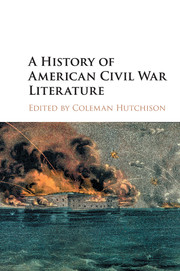Book contents
- Frontmatter
- Dedication
- Contents
- List of Illustrations
- Notes on Contributors
- Preface
- Acknowledgments
- Part I Contexts
- Part II Genres
- 6 Dépôt Culture: The Civil War and Periodical Fiction
- 7 Imitation and Resistance in Civil War Poetry and Song
- 8 Children's Literature
- 9 Writing Lives: Civil War Diaries
- 10 Civil War Memoir
- 11 Civil War Narrative History
- Part III Figures
- Recommendations for Further Reading
- Index
6 - Dépôt Culture: The Civil War and Periodical Fiction
from Part II - Genres
Published online by Cambridge University Press: 05 December 2015
- Frontmatter
- Dedication
- Contents
- List of Illustrations
- Notes on Contributors
- Preface
- Acknowledgments
- Part I Contexts
- Part II Genres
- 6 Dépôt Culture: The Civil War and Periodical Fiction
- 7 Imitation and Resistance in Civil War Poetry and Song
- 8 Children's Literature
- 9 Writing Lives: Civil War Diaries
- 10 Civil War Memoir
- 11 Civil War Narrative History
- Part III Figures
- Recommendations for Further Reading
- Index
Summary
Because the quickening circulation of nineteenth-century periodicals owed much to the wartime spread of railroads, the delivery practices they enabled might have given the Civil War's first stories a head of steam and thus a new narrative urgency. Amid the upheaval and opportunity of civil crisis, writers of the 1860s and 1870s could well have seen in the railroad's iron path and thundering power something of Lincoln's stern purpose in proclaiming emancipation or Grant's tenacity in approaching Richmond. Long associated with gathering speed, the railroad might seem a visible sign of the Northern zeal that would soon claim the postwar territories to the west and a ruined South hungry for capital. Just as importantly, a developing rail network encouraged the widening markets, swift dissemination, and keen demand for literary magazines in which the experience of civil cataclysm was first imaginatively distilled. Between the fall of Fort Sumter in 1861 and the Centennial celebrations in 1876, railroad lines helped engineer both the invasion of troops and the spread of periodicals, so it should come as no surprise if railroads took their place in early Civil War stories with all the impact of Harper's Weeklies and Atlantic Monthlies thrown from passing mail cars.
But among hundreds of short war fictions that appeared in magazines of the South and West as well as the culturally dominant Northeast, railroads actually figured much less often as hurtling machines in the garden than as accessible public lobbies – that is, as platforms, stations, and dépôts. Instead of standing in for imperial ascendancy or iron grip, such spaces suggest a deliberate pause, the unexpected hallmark of the war's first fictive traces in print. Seeking these early commemorative gestures ever since 1973, when Daniel Aaron declared the Civil War “unwritten,” literary scholars have lately been investigating periodicals in record numbers, as the work of Christopher Hager, Elizabeth Young, Alice Fahs, Linda Frost, and Coleman Hutchison has demonstrated. The fortunate result has been that less predictable fiction and poetry, drama and autobiography, illustrations and memorials have rendered the war's parlored women less polite, its soldier scribes less disengaged, its photographic operators less silent, and its freed voices less fleeting than Aaron once believed them.
- Type
- Chapter
- Information
- A History of American Civil War Literature , pp. 79 - 95Publisher: Cambridge University PressPrint publication year: 2015

